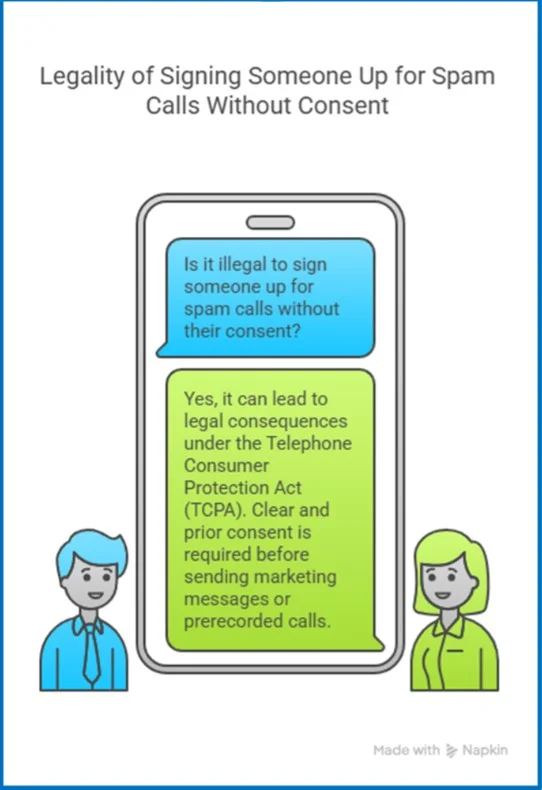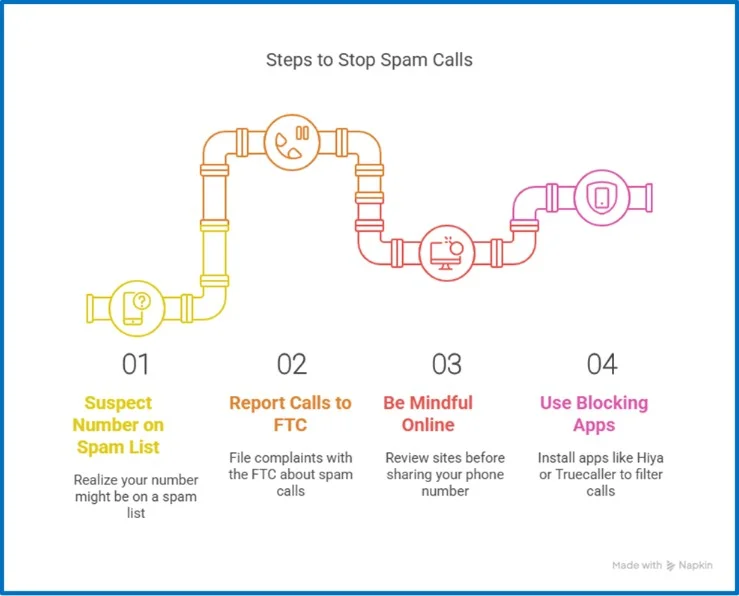Imagine receiving nonstop calls from unknown numbers. On the line, a prerecorded message offers something you never requested. It’s likely that someone submitted your number to a spam list, common in mobile deposit check scams, where stolen data is used to make fake transactions under someone else’s name.
According to Truecaller, the U.S. sees over 3.3 billion spam calls every month. Is it illegal to sign someone up for spam calls? In this post, we’ll explain what U.S. law says about it, how the Telephone Consumer Protection Act (TCPA) handles these cases, and what legal consequences might apply from doing it deliberately.
Need support after a scam? Join our community today.
What Is Spam Calling & How Does It Work?
Spam calls are phone calls you didn’t ask for, often trying to sell you something you never agreed to hear about. These calls usually come as prerecorded messages or from persistent agents you’ve never interacted with.
While they might seem like a minor issue, these calls can disrupt your day, and in many cases, they’re linked to scams. There are three common ways these calls are generated:
- Bots that dial hundreds of phone numbers every minute.
- Automated lists that are sold or leaked without consent.
- Third-party services that submit numbers through “mass registrations” in exchange for payment or personal information.
It’s important to separate this type of activity from legitimate marketing calls. A serious company will contact you only if you grant permission, frequently after agreeing to their terms. But if someone adds your number without asking, the situation shifts entirely.
This brings us to the question: Is it illegal to sign someone up for spam calls? If you never agreed to it and someone else acted for you, some laws address this kind of abuse. We’ll show you how that works in the next section.
Is It Illegal To Sign Someone Up For Spam Calls Without Their Consent?
In the U.S., signing someone up for spam calls without asking can lead to legal consequences. Even if you didn’t make the call yourself, adding another person’s number to a robocall list or submitting it through a fake website is treated seriously by the law.
What Does the TCPA Say About It?
The Telephone Consumer Protection Act (TCPA) was created to protect people from unwanted calls. Under this law:
- Clear and prior consent is required before sending marketing messages or prerecorded calls.
- The rule applies not just to businesses, but to any individual who illegally uses someone else’s number.
- Violating these terms can lead to civil penalties, even for non-commercial users.
Is It a Privacy Violation to Sign Someone Up For Spam Calls?
Yes. If you register someone’s number without their approval, it can be classified as a violation of privacy. The law doesn’t only apply to large call centers. It also applies in cases where someone:
- Uses spam lists to harass or prank others.
- Adds a number as a joke or to annoy.
- Participate in this behavior intentionally or carelessly.
What Are the Legal Consequences?
Even if someone sees it as a harmless prank, intent doesn’t eliminate liability. If the victim receives unsolicited robocalls, you could face:
- Civil lawsuits from the affected person.
- Fines, under the TCPA, may range from $500 to $1,500 per illegal call.
- A formal complaint with the Federal Communications Commission (FCC).
Have questions about dealing with scams? Contact us for support.

What Are The Ethical And Personal Implications Of Signing Someone Up For Spam Lists?
Adding someone to spam call lists without their permission is more than just an inconvenience. It’s a direct invasion of their privacy and can lead to serious emotional consequences. What might seem harmless can cause anxiety, stress, and a lasting sense of vulnerability for the person affected.
When a “Joke” Turns Into Harassment?
Using spam sign-up services as a form of revenge or digital sabotage is becoming more common. One case reported by the Cyber Civil Rights Initiative describes how someone was added to multiple spam services after a personal dispute.
- That person received over 100 unwanted calls in a single week, which had a damaging effect on their emotional health and work performance.
Even if the intention was just to “mess with” someone, the result can still be damaging and potentially illegal, depending on the circumstances. So, is it illegal to sign someone up for spam calls? Legally and ethically, the answer tends to be yes.
How Common Is Online Harassment in the U.S.?
This issue is bigger than it seems. According to the Pew Research Center:
- 41% of U.S. adults have experienced some form of online harassment.
- 25% report more severe forms, such as physical threats or repeated targeting.
Many of these statistics begin with something small—an unwanted message, call, or email that might seem like a harmless joke. But actions like signing someone up for spam calls can quickly increase, leading to real consequences.
What Are The Fines For Signing Someone Up For Spam Calls?
When someone asks it is illegal to sign someone up for spam calls, they probably don’t expect the answer to involve multi-million dollar penalties. Yet that’s exactly what has happened in several recent cases across the United States.
Authorities have penalized both companies and individuals for submitting someone else’s number without permission. One of the largest fines to date—$225 million—was issued by the FCC to a Texas company that made over one billion robocalls using fake caller IDs.
How the TCPA Handles Fines?
In the U.S., fines for violating the Telephone Consumer Protection Act (TCPA) can reach $500 per unauthorized call. And if the violation is proven to be intentional, the amount may increase to $1,500 per call. When we’re talking about thousands or even millions of calls, the total grows quickly.
Is It Possible to Face a Lawsuit for Spam Call Sign-Ups?
In addition, class action lawsuits have been filed against companies that failed to verify the numbers they contacted. In many of these cases:
- Recipients who had no relationship with the company.
- Individuals who never gave consent to be contacted.
- Victims who received dozens of unwanted calls each week.
How Are These Cases Investigated?
These cases don’t go unnoticed. Investigations usually involve:
- Reviewing call records.
- Tracing the origin of the robocalls.
- Coordinating with state and federal agencies.
What To Do If Someone Signed You Up For Spam Calls?
If you’ve noticed a sudden spike in unknown calls, there’s a chance your number was added to a spam list without your permission. Many people wonder: Is it illegal to sign someone up for spam calls? The answer is yes, but when it happens to you, the first step is knowing how to respond.
How To Know If Your Number Was Added Without Consent?
Some signs suggest your phone number is part of a spam call list, especially when the calls are repetitive and unrelated to anything you’ve requested:
These lists are often used by scammers, telemarketers, or automated systems that target numbers indiscriminately. These are that’s signs:
- You’re getting multiple calls a day from different numbers, sometimes from other countries.
- The calls are automated, or they hang up as soon as you answer.
- You start receiving promotional text messages you never signed up for.
What Can You Do to Stop Spam Calls?
If you suspect your number was added to one of these lists, it’s important to act quickly. The longer your number stays in circulation, the higher the risk of receiving robocalls, misleading messages, or more. Here’s what you can do:
- Report the calls to the FTC: You can file complaints with specific numbers or patterns you’ve noticed. This helps authorities detect illegal practices and take action.
- Be mindful of where you enter your phone number online: Many sweepstakes, surveys, or “free offers” online are just ways to collect contact data. Always review which sites you’re sharing your number with.
- Use apps to block or filter unwanted calls: Apps like Hiya and Truecaller can help screen and reduce the volume of spam calls by flagging numbers already linked to abuse.

It’s Illegal To Sign Up For Scam Calls: Protect Yourself In Time
Now it’s clear that it is illegal to sign up for scam calls isn’t just a question. Even if you thought it was just a joke or a way to annoy someone, the consequences are real: million-dollar fines, class action lawsuits, and even personal liability.
At Cryptoscam Defense Network, we help you prepare for any digital threat—from spam list fraud to more serious incidents like a cyberattack. We offer expert guidance and response protocols so you can act quickly and confidently. Contact us.
We Want to Hear From You!
Fraud recovery is hard, but you don’t have to do it alone. Our community is here to help you share, learn, and protect yourself from future fraud.
Why Join Us?
- Community support: Share your experiences with people who understand.
- Useful resources: Learn from our tools and guides to prevent fraud.
- Safe space: A welcoming place to share your story and receive support.
Find the help you need. Join our Facebook group or contact us directly.
Be a part of the change. Your story matters.
Frequently Asked Questions (FAQs) About Illegal Spam Calls
Can I Report Someone If They Signed Me Up On A Spam Site?
Yes. If someone used your number without permission to add it to spam call lists, you can report it to the Federal Trade Commission (FTC). This practice is considered a form of digital fraud, similar to clone phishing or even DeFi wallet scams.
Is It Illegal to Sign Up Someone On Spam Lists In Every Country?
Laws vary depending on the region, but in the United States, it’s already clear that it is illegal to sign someone up for spam calls. Other countries, such as Canada and the UK, also apply penalties, but under different legal frameworks.
How Hard Is It To Trace Who Signed Up My Number?
It depends on the situation. In some cases, authorities can:
- Track down web forms used to submit the number.
- Review IP addresses linked to the activity.
- Request data from platforms or service providers.
What Laws Protect Me If My Number Ends Up On Spam Lists?
In the U.S., your main protections are:
- The Telephone Consumer Protection Act (TCPA).
- The Do Not Call Registry blocks legitimate telemarketing.
- The right to report unauthorized or fraudulent calls to the FTC.







